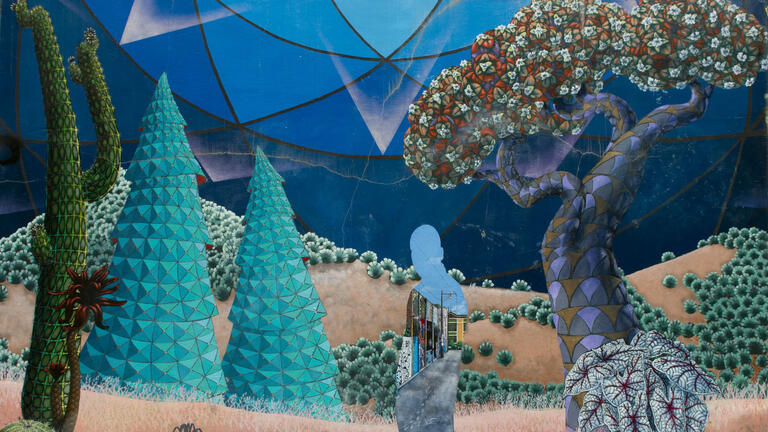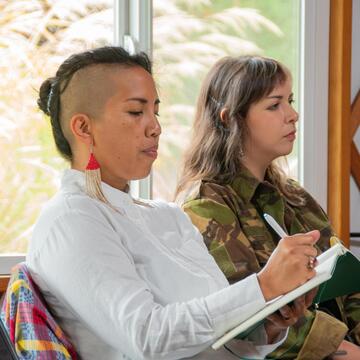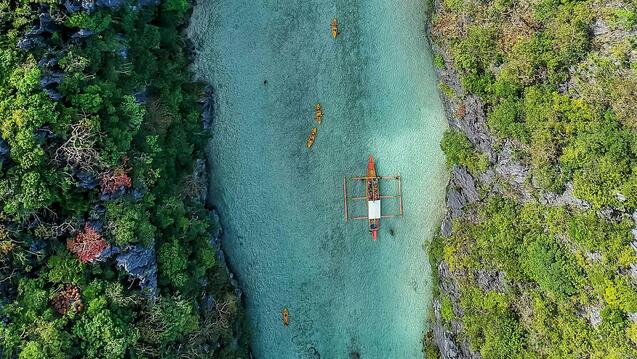
Anthropology & Social Change, M.A.
Program Overview
Our Approach
CIIS’ online master’s degree in Anthropology is unique among graduate programs for its focus on activism and social justice. You will work with some of the most prominent activist scholars and progressive organizations in the San Francisco Bay Area, as well as program faculty. Activist research, focusing on concrete utopias, makes this investigative experience rewarding both for students and the local community.
Our mission is to generate dialogue between social justice leaders and academia. Through our coursework the Anthropology and Social Change master's program creates an institutional space where social movement activists immersed in organizing can meet scholars engaged in theoretical work.
Career Paths
Combining the world of prefigurative social struggles with the world of social science and radical theory, our M.A program supports you in establishing relationships and launching your next steps with local social justice groups, organizations, movements, and campaigns.
Our graduates leave the program with:
- Extensive knowledge of critical theory and activist anthropology
- Academic skills needed for continuation of your graduate studies
- Engagement with the important debates in anthropology and other social sciences
- Experience in working with networks and community groups
- Competence in various activist research techniques
- Organizing and media skills appropriate for employment in a range of progressive and social justice professional environments.
Curriculum
Our two-year online master’s degree program is centered on the successful completion of a research-based portfolio. This portfolio will include original activist research, a collection of essays from core courses in the program, and one shorter integrative essay.
Coursework for the program consists of three areas: theoretical, media skills, and organizing skills. Theoretical courses are required and include ideas for action, global social movements, radical political economy, radical theory, and unthinking social science. For the skills-based coursework, you will have the opportunity to choose two courses:
- Media skills: Strategic filmmaking, writing and publishing, Internet skills, radical radio.
- Organizing skills: Legal skills, policy analysis, environmental skills, economic skills, and campaigning and organizing skills.
Each semester, a residential intensive is also held to foster community-building while also accruing units. Over the week, you will have an inspiring experience that includes fieldwork exercises, skills-based in-person courses, attending public talks and film screenings, and other collaborative sessions.
Featured Courses
Social Movements and Social Change (2 units) This seminar examines moments and movements of social protest on a world scale, from the early centuries of capitalist development to the present. The course covers a broad history, ranging from periods of path-breaking revolutions (e.g., “the Age of Revolutions” in the late 18th century) through anarchist, Marxist, feminist, and anticolonial movements in the 20th century, to global outbreaks of social movements surrounding 1968, to antiglobalization, autonomous, and occupy movements. Our aim is nothing less than an understanding of how antisystemic movements have successively challenged and changed the colonial/capitalist world system over the last three centuries.
Activist Ethnography (3 units) The distinctive quality of our department is collaborative research of everyday utopias. In this course, you will be introduced to the practice and theory of what we refer to as activist ethnography. This is our signature approach to the study of social change and it rests on investigation of different research strategies associated with collaborative research of viable alternatives to the present order of things. We emphasize co-research and direct action, horizontality and self-activity, seen as essential ingredients of collaborative knowledge production. Activist ethnography attempts to combine research interest in militant ethnography, drift, mapping, co-research, participatory action research, workers inquiry, and radical oral history with collaborative and engaged participant observation. In this experimental play with different forms of politically engaged collaborative investigation, we strive to construct a distinct model of activist research. If the first element of our approach is ethnographic, the second element is our active interest in forms of self-organization developed in opposition to, and on the margins of capitalist modernity.
Contemporary Capitalism (3 units) All you ever wanted to know about capitalism but were too exploited to ask. This course will offer an introduction to political economy from a Marxist perspective. It introduces you to radical approaches to political economy and offers a critical perspective that provides an alternative to conventional economic theory as well as to more economic determinist versions of Marxian political economy. Can there be such a thing as a free market? What is globalization? Does capitalism have an “outside”? And what on earth is “overdetermination”? This course provides an understanding of economic processes and larger contexts of exploitation and domination.
-
Semester 1 | Fall
ANTH 6148 Approaches to Theory (3 units)
ANTH 6160 Activist Ethnography (3 units)
General Elective(s) (3 units)
Semester 2 | Spring
ANTH 6152 Global Social Movements (2 units)
ANTH 6159 Image and the Ethnographic Imagination (2 units)
General Electives (5 units)
Semester 3 | Fall
ANTH 6404 Ecology, Climate, and the Crisis of Nature (2 Units)
General Electives (7 units)
Semester 4 | Spring
ANTH 6198 Contemporary Capitalism (2 units)
ANTH 6599 Integrative Seminar (3 units)
General Electives (4 units)
*See current course catalog for situational differences in course sequence.
Entry Requirements
Applicants to the master’s in Anthropology and Social Change program do not need to have an undergraduate major in anthropology, however, it is necessary to have had at least three upper-division-level social science courses. If lacking, these courses can usually be taken concurrently with graduate courses, although they will not be counted toward required degree units.
Required Application Materials
Your application is your opportunity to share who you are. To be considered essays and written responses must be your own authentic work.
Online Admissions Application: Begin the application process by submitting an online application and paying the nonrefundable $68 application fee.
Degree Requirement: An undergraduate degree (B.A., B.S., or the equivalent) from an accredited college or university.
Minimum GPA: A GPA of 3.0 or higher in previous coursework is required. However, a GPA below 3.0 does not automatically disqualify an applicant; CIIS will consider a prospective student whose GPA is between 2.0 and 3.0. These individuals are required to submit a GPA Statement and are encouraged to contact the Admissions Team to discuss their options.
Transcripts: Official transcripts from all accredited academic institutions attended where 7 or more credits have been earned. Transcripts may be sent digitally to materials@ciis.edu or mailed to CIIS in their official, sealed envelope. Transcripts from institutions outside the U.S. or Canada require a foreign credit evaluation through World Education Services (WES). CIIS will also accept foreign credential evaluations that are in a comprehensive course-by-course format from the current members of the National Association of Credential Evaluation Services (NACES).
Statement of Purpose: A four-to-six-page (typed, double-spaced) statement of your educational and professional objectives, including any significant biographical events that directly influenced your decision to apply to this program. The personal statement should also articulate what you hope to gain from your time in the program and, if appropriate, how your time in the program relates to your long-term personal and professional aspirations.
Academic Writing Sample: A writing sample of six-to-eight pages (typed, double-spaced) that demonstrates the applicant’s capacity to think critically and reflectively at the appropriate academic level. Applicants may submit academic papers, articles, or reports that reflect scholarly ability and include proper citations. Please include a cover and reference page.
Two Letters of Recommendation: We require two letters of recommendation, ¾-1 page in length. One from an academic advisor or someone familiar with the applicant's ability to do academic work, and one from a supervisor in a recent professional or volunteer setting. Recommenders should use standard business format and include full contact information-name, email, phone number, and mailing address.
Events and Info Sessions
An online event with Admissions Counselors
A Conversation with Carl Lorenz Cervantes



Take the Next Step
For over 50 years, CIIS has been at the forefront of education that integrates rigorous science, innovative scholarship, and social justice. You will learn from faculty at the forefront of their fields, local artists and activists, and a community of peers as passionate and dedicated as you. There’s never been a better time to be here – let’s build a healthier and more equitable world.



